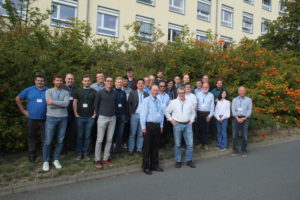
Prof. John P. Perdew and Prof. Hannes Jonsson are in the middle of the first row.
Psik funded workshop Quo vadis Self-Interaction Correction (QVSIC)? September 23-26 2019, Freiberg, Germany
The meeting brought together together senior experts and young researchers from all over the world. The workshop took place in Freiberg, Germany and 27 scientists from 6 countries attended. The participation of Prof. John P. Perdew, Prof. Hannes Jonsson and Prof. Mark R. Pederson, three researchers who have developed important concepts of self-interaction correction (SIC) within density functional theory was a great experience and an honour for all the participants.
The main topics were:
- Successes and failures of SIC
- Real and complex-valued orbitals for SIC
- Generalizations of SIC
- Alternative SIC methods
The scientific program contained 3 plenary talks, 15 invited talks and 10 poster presentations. Further details of the workshop can be found online https://indico.physik.tu-freiberg.de/event/1/ or see Report_onQVSIC_meeting2019
